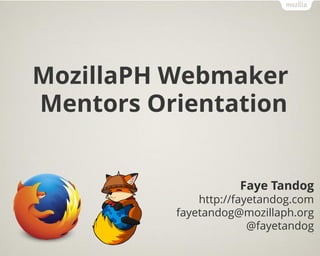MozillaPH Webmaker Mentors Orientation
- 1. Faye Tandog http://fayetandog.com fayetandog@mozillaph.org @fayetandog ` MozillaPH Webmaker Mentors Orientation
- 2. Hi! IŌĆÖm Faye. ŌĆó Mozilla Reps Mentor ŌĆó Community Manager, MozPH ŌĆó Education and WoMoz Lead ŌĆó Systems and procedures at a car manufacturing company
- 4. MozillaŌĆÖs Mission To promote openness, innovation & opportunity on the Web.
- 10. Mozilla in the Philippines Since 17 SEP 2009 (Yes! WeŌĆÖre turning 5 this year!) 84 vouched Mozillians (active contributors) 172 events from Jan 2012 to Dec 2013 961 ŌĆ£followersŌĆØ in Twitter 1,987 ŌĆ£likersŌĆØ in Facebook 100k++ unique visitors to MozillaPH.org (powered by WordPress) As of May 4, 2014
- 13. Why does Mozilla care about Web literacy? https://mozilla.github.io/webmaker-whitepaper/
- 14. ŌĆ£[O]ur world changed in April 1993 when the Mosaic 1.0 browser was released to the general public. We need new forms of education. We need to reform our learning institutions, concepts, and modes of assessment for our age. Now, anyone with access to the World Wide Web can go far beyond the passive consumer model to contribute content on the Web. We can customize and remix, alone or in collaboration with others, located anywhere on the Web. That Do-It-Yourself potential for connected, participatory, improvisational learning requires new skills, what many are calling new ŌĆ£literaciesŌĆØ.ŌĆØ -Davidson, 2012
- 15. Mozilla understands web literacy to be the skills and competencies required to read, write and participate effectively on the web
- 16. We #teachtheweb webmaker.org We're a global community dedicated to teaching digital skills & web literacy. We explore, tinker & create together to build a web that's open & made by everyone.
- 19. WEBMAKER TOOLS DEMO ŌĆó Thimble ŌĆó Popcorn ŌĆó X-ray Goggles ŌĆó Appmaker https://webmaker.org/tools
- 20. Webmaker Mentor https://webmaker.org/en-US/mentor No application process, just teach! Just: 1. Create and share resources 2. Host Webmaker events 3. Join community calls 4. Keep in touch!
- 21. Why become one? ŌĆó Expand your network ŌĆó Grow your reach ŌĆó Get gear ŌĆó Shape standards ŌĆó Be on the cutting edge
- 23. #teachtheweb events party.webmaker.org July 15- Sept. 15
- 24. Organizing an event 1. Plan 2. Get ideas & resources from webmaker.org 3. Add the event to http://events.webmaker.org 4. Ask Mozilla Reps for support 5. Hold the event!
- 25. Guidelines in organizing a Webmaker event 1. The Mozilla Reps in the PH have to ensure that Mozilla is not misrepresented on your event. 2. Mozilla has its branding guidelines. Consult with a Rep about it ’üŖ 3. Charging the participants with any amount is strictly not allowed. 4. Any form of gaining profit from organizing the event (i.e. selling shirts, food etc.) is strictly not allowed. 5. Reps are very much willing to teach you Events 101 ’üŖ
- 26. Getting in Touch with the Global Community 1. Tweet #teachtheweb and @Webmaker 2. Join the mailing list (https://sendto.mozilla.org/page/s/mentor- signup) 3. Join the forum (https://plus.google.com/u/0/communities/ 106022863174952221205) 4. Join Community Calls (https://wiki.mozilla.org/Webmaker/Mentor/ Community_Calls)
Editor's Notes
- The devt of Mozilla products relies upon community involvement and contribution We collaborate on a global basis to ensure everyone can be informed contributors and creators of the web. This act of human collaboration across an open platform we believe to be essential to individual growth and our collective future.
- So in Mozilla, other than the devt of products to drive innovation in the Internet, as a non-profit, we have our community building aspects.. We create projects and programs to keep the web open. We have contribution areas, so yung mga enumerated ditto na areas, for contributors and if you want to level up being a contributor, dun na yung Mozilla Reps.
- You might be curious why Mozilla, a ŌĆ£tech companyŌĆØ cares about web literacy. Well first of all, Mozilla is a non-profit org. so yun ang unique sa Mozilla, nowadays kasi if we talk about tech anong unang naiisip? Di ba ŌĆśmagkanoŌĆÖ? Mozilla doesnŌĆÖt really care about delivering profit. We just want to keep the web open for all because we love the web and we believe in its potential.
- This campaign in in line with the Maker Movement, that is to show that companies are not the ones who feed us with tech, show that we can also take part in making. Coding is just the tip of the iceberg "Coding is just the tip of the iceberg," he said. "This is about full-scale digital literacy. How to build things with code, design and video and photography. And there are a set of creative, social and cognitive skills -- participation, design thinking. These are the skills you need to find your way in the digital world." We came to the conclusion that just building products with the values of the open Internet were not enough," he said. "We want the billions of people on the Internet to know how it works to get the most out of it."














![ŌĆ£[O]ur world changed in April 1993 when the Mosaic
1.0 browser was released to the general public. We
need new forms of education. We need to reform our
learning institutions, concepts, and modes of
assessment for our age. Now, anyone with access to
the World Wide Web can go far beyond the passive
consumer model to contribute content on the Web. We
can customize and remix, alone or in collaboration
with others, located anywhere on the Web.
That Do-It-Yourself potential for connected,
participatory, improvisational learning requires
new skills, what many are calling new ŌĆ£literaciesŌĆØ.ŌĆØ
-Davidson, 2012](https://image.slidesharecdn.com/mozphwebmakermentorsorientation-140810092748-phpapp02/85/MozillaPH-Webmaker-Mentors-Orientation-14-320.jpg)













